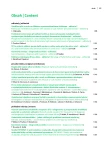-
Medical journals
- Career
PATHWAY-2 Study: spironolactone vs placebo, bisoprolol and doxazosin to determine optimal treatment of resistant hypertension.
Spironolactone high effective in lowering blood pressure in drug resistant hypertension
Authors: Jiří Widimský
Authors‘ workplace: Klinika kardiologie IKEM Praha, přednosta prof. MUDr. Josef Kautzner, CSc., FESC
Published in: Vnitř Lék 2015; 61(12): 1067-1071
Category: Reviews
Overview
The PATHWAY-2 study, funded by the British Heart Foundation, randomised 335 patients with resistant hypertension (already treated according to guidelines) to sequentially receive 12 weeks of spironolactone (25–50 mg), bisoprolol (5–10 mg), doxazosin (4–8 mg modified release) and placebo. The study design allowed drug comparisons in each patient, with 230 patients completing all cycles. Results showed that spironolactone reduced home systolic BP by 8.70 mm Hg more than placebo (< 0.001), 4.26 mmHg more than bisoprolol/doxazosin (< 0.001), 4.03 mm Hg more than doxazosin (< 0.001), and by 4.48 mm Hg more than bisoprolol. By the end of the trial, there would only be 15 patients considered eligible for renal denervation trials in uncontrolled hypertension. PATHWAY-2 will have significant implications for patient recruitment in to other trials.
Key words:
corticoid receptor agonists – resistant hypertension – spironolactone
Sources
1. Filipovský J, Widimský jr J, Ceral J et al. Diagnostické a léčebné postupy u arteriální hypertenze – verze 2012. Doporučení České společnosti pro hypertenzi. Vnitř Lék 2012; 58(10): 785–801.
2. Ceral J. Rezistentní hypertenze, farmakologické i nefarmakologické přístupy. In: Widimský jr, J, Widimský J (eds) et al. Hypertenze. Triton: Praha 2014 : 337–347. ISBN 978–80–7387–811–5.
3. Štrauch B, Zelinka T, Bernhardt R et al. Prevalence of primary hyperaldosteronismus in moderate to severe hypertension in Central Europe region. J Hum Hypertens 2003; 17(5): 349–352.
4. Ceral J, Habrdová V, Voříšek V et al. Difficult to control arterial hypertension or uncooperative patients? The assessment of serum antihypertensive drug levels too differentiate nonresponsiveness from nonadherence to recommended therapy. Hypertens Res 2011; 34(1): 87–90.
5. Štrauch B, Petrák O, Zelinka T et al. Precise assessment of noncompliance with the antihypertensive therapy in patients with resistant hypertension using toxicologic analysis. J Hypertension 2013; 31(12): 2455–2461.
6. Williams B, MacDonald TM, Morant S et al. The British Hypertension Society´s PATHWAY Studies Group. Spironolactone versus placebo, bisoprolol, and doxazosin to determine the optimal treatment for drug-resistant hypertension (PATHWAY-2): a randomised, double-blind, crossover trial. Lancet 2015; 386(10008): 2059–2068.
7. Kaplan NM. Indapamide. Is It The Better Diuretic for Hypertension? Hypertension 2015; 65(5): 983–984.
8. Roush GC, Ernst ME, Kostis JB et al. Head-to-head comparisons of hydrochlorothiazide with indapamide and chlorthalidone: antihypertensive effects and metabolic effects. Hypertension 2015; 65(5): 1041–1046.
9. Widimský J. Indapamid, chlorthalidon a hydrochlorothiazid v léčbě hypertenze – situace v roce 2014. Medicína po promoci 2014; 15: (Suppl 1): 21–26.
10. Václavík J, Sedlák R, Plachý M et al. Addition of Spironolactone in Patients With Resistant Arterial Hypertension (ASPIRANT). A Randomized, Double-Blind, Placebo-Controlled Trial. Hypertension 2011; 57(6): 1069–1075.
11. Dahlöf B, Sever PS, Poulter NR et al. Prevention of cardiovascular events with an antihypertensive regimen of amlodipin adding perindopril as required versus atenolol adding bendroflumethiazide as required. In theAnglo-Scandinavian Cardiac Outcomes Trial-Blood Pressure Lowering Arm (ASCOT-BPLA): a multicentre randomized controlled trial. Lancet 2005; 366(9489): 895–906.
12. Pigmenta E, Gaddam KK, Oparil S et al. Effects of dietary sodium reduction on blood pressure reduction in subjects with resistant hypertension: results from a randomized trial. Hypertension 2009; 54(3): 475–481.
13. Taler SJ, Textor SC, Augustine JE. Resistant hypertension: comparing hemodynamic management to specialist care. Hypertension 2002; 39(5): 982–988.
14. Dahal K, Kunwar S, Rijal J et al. The effects of aldosterone antagonists in patients with resistant hypertension: a meta-analysis of randomised and non-randomised studies. Am J Hypertens 2015; 28(11):1376–1385.
15. Elmela FE, Elmela F, Yu Jin et al. Metaanalysis of randomized controlled trials of renal denervation in treatment – resistant hypertension. Blood Pressure 2015; 24(5): 263–274.
Labels
Diabetology Endocrinology Internal medicine
Article was published inInternal Medicine

2015 Issue 12-
All articles in this issue
- Regional registry of pulmonary embolism
- Antithrombotic therapy and nonvariceal upper gastrointestinal bleeding
- Ventilatory function in patients with silicosis or coal workers’ pneumoconiosis
- Lenalidomide treatment in myelodysplastic syndrome with 5q deletion – Czech MDS group experience
- Investigation of tubular reabsorption of phosphates in patients with chronic kidney disease
- Role of soluble receptor ST2 measurment in diagnosis and prognostic stratification in patients with heart failure
- Geriatric multimorbidity – one of the key problem of contemporary medicine
- Carotid stenosis – diagnosis and treatment
-
PATHWAY-2 Study: spironolactone vs placebo, bisoprolol and doxazosin to determine optimal treatment of resistant hypertension.
Spironolactone high effective in lowering blood pressure in drug resistant hypertension - Monoclonal immunoglobulin (M-Ig) and skin diseases from the group of mucinoses – scleredema adultorum Buschke and scleromyxedema. Description of four cases and an overview of therapies
- Uncorrected Tetralogy of Fallot – a case report of a 69-year-old patient
- Medicine at a polar station in Antarctica
- Internal Medicine
- Journal archive
- Current issue
- Online only
- About the journal
Most read in this issue- Carotid stenosis – diagnosis and treatment
- Geriatric multimorbidity – one of the key problem of contemporary medicine
- Investigation of tubular reabsorption of phosphates in patients with chronic kidney disease
- Ventilatory function in patients with silicosis or coal workers’ pneumoconiosis
Login#ADS_BOTTOM_SCRIPTS#Forgotten passwordEnter the email address that you registered with. We will send you instructions on how to set a new password.
- Career

